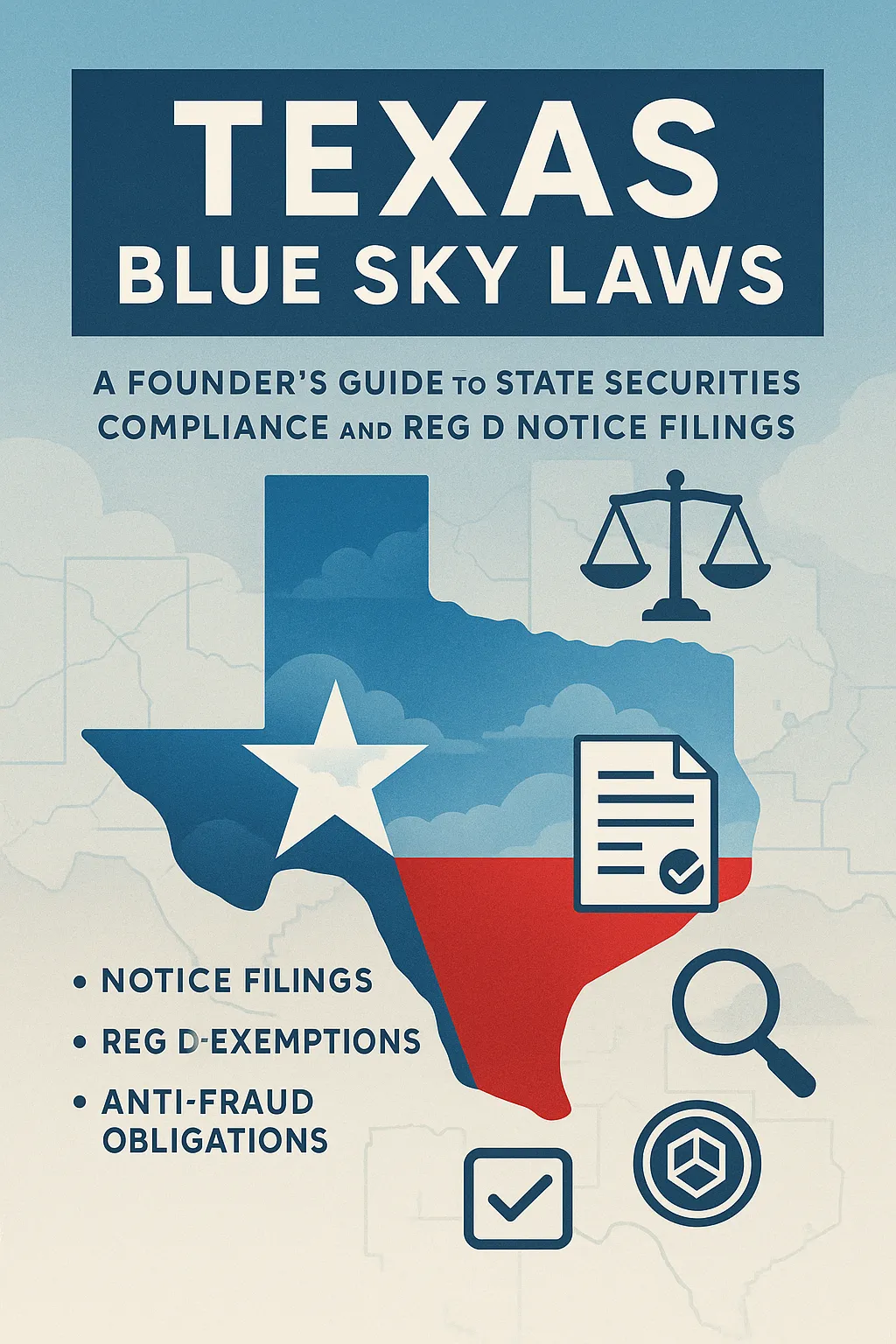Texas Blue Sky Law + NSMIA: A Founder’s Field Guide

TL;DR (use this when planning a raise):
- If you offer or sell a security to a Texas resident, Texas law applies in some way—even if you rely on a federal exemption.
- NSMIA preempts state registration/merit review for covered securities (e.g., Rule 506(b)/(c)) but Texas still requires notice filings/fees for sales to Texas residents and always enforces anti‑fraud.
- Track “first sale” precisely; it drives SEC Form D and Texas notice timing.
- Choose your path before you market: controlled outreach → 506(b); public campaign → 506(c) with accredited‑status verification.
What this article covers
- What “Blue Sky” laws are and the role of the Texas State Securities Board (TSSB)
- What counts as an offer or sale in Texas
- Anti‑fraud duties that always apply
- NSMIA preemption: what it removes and what it preserves for Texas
- A quick decision frame to see if/when Texas law applies
- Cross‑state context (NY, merit‑review states, crypto‑forward regimes)
- Quick FAQs
Blue Sky in Texas: the basics
Blue Sky laws are state securities laws. In Texas, they govern:
- Offers and sales of securities (common/preferred stock, SAFEs, convertible notes, many token arrangements)
- Registration of securities and intermediaries (unless an exemption applies)
- Anti‑fraud prohibitions (always on)
- Enforcement (investigations, penalties, rescission risk)
TSSB’s role: administers and enforces the Texas Securities Act; handles notice filings (including Reg D Rule 506 notices for sales to Texas residents), investigates misconduct, and issues rules and guidance.
Why founders should care: Getting Texas right prevents inquiries, penalties, rescission demands, and closing delays. Even when you rely on a federal exemption, Texas notice + anti‑fraud remain.
What counts as an “offer” or “sale” in Texas
Texas looks at substance over form:
- Directed into Texas: Emailing a deck to a Texas resident, pitching a Texas VC over Zoom, or running ads targeting Texans can be an offer in Texas.
- Sales to Texas purchasers: A Texas resident’s subscription is a sale in Texas.
- Timing: Filings generally key off the first sale (first binding subscription/wire/countersignature making the investor irrevocably committed).
Practical move: Maintain a state‑by‑state tracker with investor state and first‑sale date to know where and when notices are due.
Anti‑fraud applies to everything (private or public)
You may not make any untrue statement of a material fact or omit a material fact necessary to make statements not misleading.
Implications for your raise:
- Keep decks, data room, financials, cap table, projections, PR strictly aligned.
- Tailor risk factors to your business and instrument (e.g., SAFE/note risks).
- Treat social posts, website copy, demo‑day remarks as investor communications.
- For public campaigns under 506(c), verify accreditation with reasonable steps; for private 506(b), avoid general solicitation entirely.
NSMIA: what’s preempted and what’s not
Preempted: For “covered securities” (including Rule 506(b)/(c) offerings), states cannot impose registration or merit review.
Not preempted in Texas:
- Notice filings and fees for sales to Texas residents (file via NASAA EFD)
- Anti‑fraud and enforcement
- Certain advertising and salesperson/broker‑dealer rules
Multi‑state dynamic: File SEC Form D within 15 calendar days after the first sale, then make state notices (including Texas) in each purchaser’s state as required.
Quick decision frame: Do Texas Blue Sky laws apply?
- Is it a security?
- Equity (common/preferred), SAFEs, convertible notes, many token structures → likely yes.
- If it’s not a security (e.g., bona fide non‑investment pre‑sales), Blue Sky may not apply—confirm with counsel.
- Who are your offerees/purchasers?
- Texas purchasers → expect Texas notice under Rule 506.
- Multi‑state → coordinate federal exemption and state notices for each purchaser’s state.
- Which exemption?
- Rule 506(b): no general solicitation; practically all purchasers accredited for startups; Texas notice after first Texas sale.
- Rule 506(c): general solicitation allowed; verify accreditation with reasonable steps; Texas notice after first Texas sale.
- Reg CF: through a registered portal; Texas anti‑fraud still applies.
- Intrastate: Texas‑only offers/sales under Rule 147/147A plus state exemption—operationally strict.
- Are you publicly marketing?
- Public marketing → 506(c) + verification.
- Controlled, relationship‑based outreach → consider 506(b).
Cross‑state context (why Texas is different but familiar)
- New York (Martin Act): Enforcement‑forward; if you include NY investors, increase diligence, disclosures, and PR discipline.
- Merit‑review states: Less relevant for Rule 506 (federal preemption), but crucial if you ever use non‑covered paths (e.g., some Reg A/intrastate offerings).
- Crypto‑forward regimes (e.g., Wyoming): Operational flexibility doesn’t remove federal/state securities analysis. Substance controls.
FAQs
Does NSMIA mean Texas can’t touch my 506 round?
NSMIA removes registration/merit review, but Texas still requires notice filings/fees for Texas purchasers and retains anti‑fraud authority.
If I pitch publicly, can I still use 506(b)?
No. Public marketing is general solicitation. Use 506(c) and verify accreditation with reasonable steps.
Do SAFEs/notes avoid securities laws?
No. They are securities. Choose and follow an exemption; file Texas notices if you sell to Texas residents.
References & Sources
- Texas State Securities Board (TSSB) — filings, guidance: https://www.ssb.texas.gov
- NASAA Electronic Filing Depository (EFD): https://www.efdnasaa.org
- Regulation D (17 CFR Part 230) (overview): https://www.ecfr.gov/current/title-17/chapter-II/part-230
- Rule 148 (demo days): https://www.ecfr.gov/current/title-17/section-230.148
- Rule 152 (integration): https://www.ecfr.gov/current/title-17/section-230.152
Feedback & Corrections
See our Corrections Policy and email [email protected] with updates or suggestions.
Disclaimer
This article is for informational purposes and is not legal advice. Requirements change—verify current Texas procedures/fees on the TSSB site and consult counsel for your facts.

